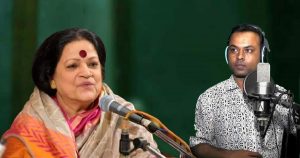The High Court has asked why the decision to stop the rickshaw-pullers wearing lungi entering Baridhara at the capital’s Gulshan would not be declared illegal.The bench of Justices Quazi Reza-Ul Hoque and ABM Altaf Hossain on Tuesday issued the rule on their own volition following a news report on the matter.
The court also asked the President and General Secretary of the Baridhara Housing Society, Deupty Commissioner of police’s Gulshan zone and Gulshan Police Station OC to respond within two weeks.
Deputy Attorney General Biswajit Roy argued for the state at the hearing.
A Dhaka newspaper on Apr 3 ran a report that rickshaw-pullers wearing lungi were barred from entering Baridhara, one of the posh neighbourhoods in Dhaka where diplomats and affluent people live.
The ban was imposed by the Baridhara Housing Society, an organisation of the home owners.
The instructions given by the Baridhara Housing Society to the security staff included that rickshaw-pullers must wear trousers to enter Baridhara.
Protesting the move, hundreds of youths held a ‘Lungi March’ on Apr 13 in the area and the issue was hotly discussed on social media.
Speaking to bdnews24.com on Tuesday, rickshaw-puller Farhad Mia said his rickshaw was the only way to earn a living. “I’ll do what they tell us to do as long as I can drive my rickshaw.”
“I bought a trouser that cost me Tk 120. But I cannot wear it for a long time. It’s very uncomfortable. It feels hot,” he said.
Earlier Justnews reported: While Bangladesh has been roiled by political protests, a demonstration of a different kind has taken place over a ban on rickshaw drivers wearing lungi, a traditional sarong-like garment that is worn by millions throughout the country.
A feature posted on the webpage of Al Jazeera, a Qater-based international news agency, said a crowd of several hundred youths filled the streets of Dhaka on Saturday flaunting colourful lungi, to protest the ban recently imposed on the dress in Baridhara diplomatic zone of the capital.
Although lungi is the most commonly adorned garb by men in Bangladesh, the long skirt-like dress is considered in some circles, especially the richest one, to be worn by the lower class.
The feature mentioned that more than 400 marchers – including students, young professionals and cyclists – protested the ban on rickshaw drivers from wearing the lungi in Baridhara, one of the most upmarket neighbourhoods in the Bangladesh`s capital.
Some familiar with the dress took a traditional route, confidentially tucking and tying their lungi around their waists without underwear. While those who tried the traditional dress for the first or second time shyly left their undergarments on.
The peaceful rally was announced on facebook just days after Firoz Hassan, the chairman of Baridhara Housing Association, said only rickshaw-pullers wearing trousers would be allowed to work the area.
When asked for an interview, Hassan’s associates said he was not available for comment.
“The decision to ban the lungi goes against our history. This is our national dress. Banning the lungi is going against our nation, period,” said Shadman Islam, a participant in the unusual street demonstration.
Worn by the male section of the 16 million populations from all strata of the society, the traditional garment has been donned to show national expression and pride. Founder of Bangladesh Bangabandhu Sheikh Mujibur Rahman wore a white lungi often to show his solidarity with the people of his homeland.
Nafisa Binti Aziz, one of the few female demonstrators dressed in a lungi, described the ban as outright discrimination against rickshaw drivers.
“If they ban it for the rickshaw-pullers in Baridhara, then they should ban it for everyone,” she said.
While the ban focused on the rickshaw-pullers, they themselves did not have much to do with the demonstration.
Moinal, a rickshaw-puller with only one name, watched the protesters but said he had no idea what was going on.
“I don’t know what this is, but I think it’s nice that the young generation is wearing the lungi,” he said.
Arshad Ali, a 30-year-old rickshaw driver who was also not participating in the unique protest, said the ban was nothing new.
“This has been going on for many years. They just don’t let you into their neighbourhood if you are not dressed nicely. You have to wear dress shirts and dress pants. I purposefully avoid that part of town for my own protection,” said Ali.
Rickshaw-pullers are commonly referred to as “rickshaw-wallah” throughout South Asia.
According to a report by the Dhaka Urban Transport Network in 2011, the average income of a rickshaw-wallah is about Tk 350 ($ 4) a day, excluding rental fees for the rickshaws that can cost Tk 80 ($ 1) per day.
As the young protesters marched towards Baridhara chanting “lungi, lungi”, they were stopped by dozens of cops blocking the entrance with guns and batons in hand.
Protesting is not allowed in diplomatic enclave of Dhaka, according to officers on the scene. Within an hour, the crowd had largely disappeared in the face of stiff police obstruction, the Al Jazeera report added.
(Source: Agencies)




